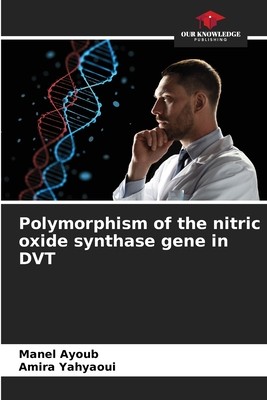
- We will send in 10–14 business days.
- Author: Manel Ayoub
- Publisher: Our Knowledge Publishing
- ISBN-10: 6205263041
- ISBN-13: 9786205263044
- Format: 15.2 x 22.9 x 0.4 cm, softcover
- Language: English
- SAVE -10% with code: EXTRA
Polymorphism of the nitric oxide synthase gene in DVT (e-book) (used book) | bookbook.eu
Reviews
Description
Deep vein thrombosis is a disease linked to both genetic and acquired risk factors. Several new risk factors are incriminated such as the T786C polymorphism of the eNOS gene. The objective of this study is to determine the frequency of this polymorphism in a group of patients compared to a group of controls in order to evaluate its role in the development of deep vein thrombosis. Study including 31 patients with deep vein thrombosis and 31 control subjects, carried out in the biochemistry laboratory in collaboration with the internal medicine department. All the subjects of the study had the assays of lipid parameters, ultrasensitive CRP as well as a genetic study by the PCR-RFLP technique.Results: Our results showed that the frequency of the CC genotype in patients (6.5%) is higher than that in controls (3.2%). The study of allelic frequency showed that the C allele is more frequent in patients (8.1%) than in controls (6.5%). There is no statistically significant difference our results suggest the non-involvement of the T786C polymorphism
EXTRA 10 % discount with code: EXTRA
The promotion ends in 12d.16:46:38
The discount code is valid when purchasing from 10 €. Discounts do not stack.
- Author: Manel Ayoub
- Publisher: Our Knowledge Publishing
- ISBN-10: 6205263041
- ISBN-13: 9786205263044
- Format: 15.2 x 22.9 x 0.4 cm, softcover
- Language: English English
Deep vein thrombosis is a disease linked to both genetic and acquired risk factors. Several new risk factors are incriminated such as the T786C polymorphism of the eNOS gene. The objective of this study is to determine the frequency of this polymorphism in a group of patients compared to a group of controls in order to evaluate its role in the development of deep vein thrombosis. Study including 31 patients with deep vein thrombosis and 31 control subjects, carried out in the biochemistry laboratory in collaboration with the internal medicine department. All the subjects of the study had the assays of lipid parameters, ultrasensitive CRP as well as a genetic study by the PCR-RFLP technique.Results: Our results showed that the frequency of the CC genotype in patients (6.5%) is higher than that in controls (3.2%). The study of allelic frequency showed that the C allele is more frequent in patients (8.1%) than in controls (6.5%). There is no statistically significant difference our results suggest the non-involvement of the T786C polymorphism


Reviews